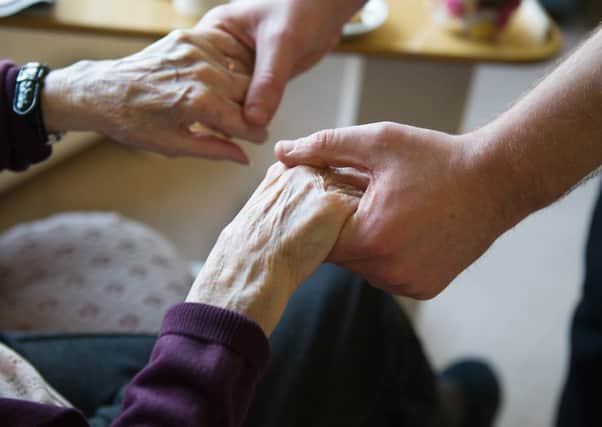Dave Watson: We must be prepared to pay price for compassion


If ever there was a policy that showed us to be compassionate universalists its free personal care. Hailed as a triumph of Scottish egalitarianism, different from the rest of the UK, Scottish political parties fall over to credit themselves for introducing or improving it.
It is a strategic answer to one of our big national challenges, in this case an ageing population. In the past decade we have seen the number of centenarians in Scotland almost double while projections suggest that the population of Scotland will age significantly in the next decades, with the number of over 65s increasing by more than 50 per cent in a generation.
Advertisement
Hide AdAdvertisement
Hide AdFree personal care is a legal right for all 65 year olds who are assessed by their local authority as needing it. A range of needs are assessed from counselling, mobility, food preparation, personal hygiene – bathing, showering, hair washing, shaving and tooth brushing – to simple medical treatments like applying creams or simple dressings; and assistance to get up and go to bed.
As the ageing population has increased so have these needs, and the costs in delivering them, in fact by 160 per cent since it was introduced by the Labour-Liberal coalition in 2002. The Scottish Government highlights the success of the policy, more people are being cared for at home rather than hospitals or care homes. This is true and to be applauded. But there-in lies the problem.
Our NHS is also being squeezed. More pressure is heaped on to move patients from hospitals to being cared for at home by local authorities who, by the way, have taken the brunt of the cuts since 2007.
Unison represent the workforce – an army of low paid (mostly) women and their managers – who have the task of delivering free personal care. They give us a more complex, less compassionate picture.
Patients are getting more difficult to handle. They are being kept at home with more serious illnesses and a home care workforce are being asked to use more and more equipment to handle them like hoists and stand aids, which are difficult to use on carpets and in small spaces. More patients are seriously overweight and difficult for two never mind one carer to handle.
Care workers have no choice but to administer medicines which are not in their job description and they carry out tasks they have not had the training to do. They are being asked to fit more and more into 15-minute care slots meaning they have less time to spend talking and listening to their patients.
The workforce, say they do a lot more (mostly unpaid) overtime. They get calls on their days off asking them to take on more shifts. Some fight to be able to take annual leave. As one Unison member told us: “We don’t get any downtime. I am so exhausted that when I get home I am not able to enjoy my own home life.”
The real issue is that no matter the time allocated, squeezed budgets mean squeezed managers who have to squeeze as much out the workforce as possible to get this vital service delivered. This is not a compassionate service for a growing elderly population. It’s a policy with serious problems. I can come to no other conclusion other than free personal care needs a full-scale review asking how we ensure that we can really care for an ageing population putting compassion at the centre of the service.
• Dave Watson is head of policy and public affairs at Unison Scotland